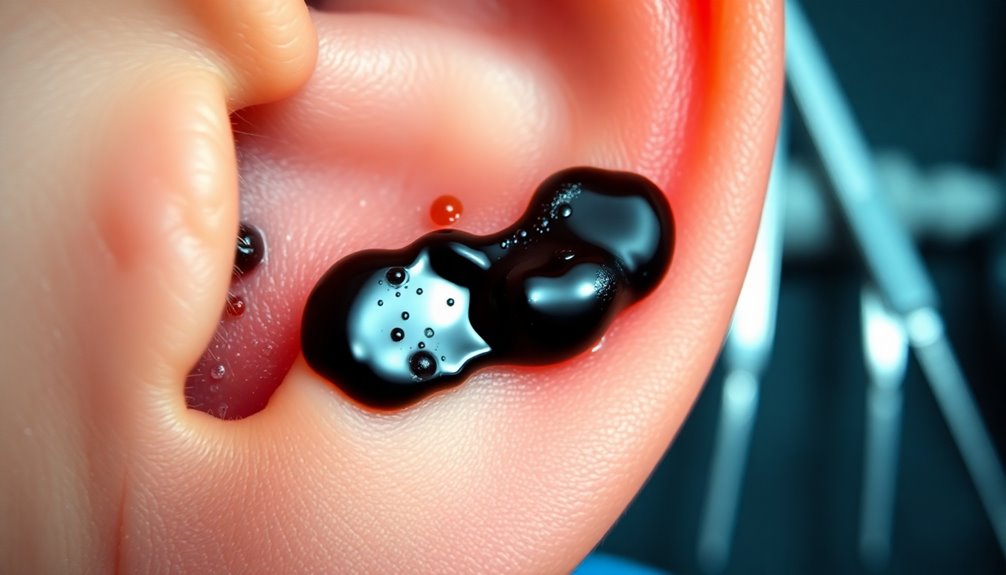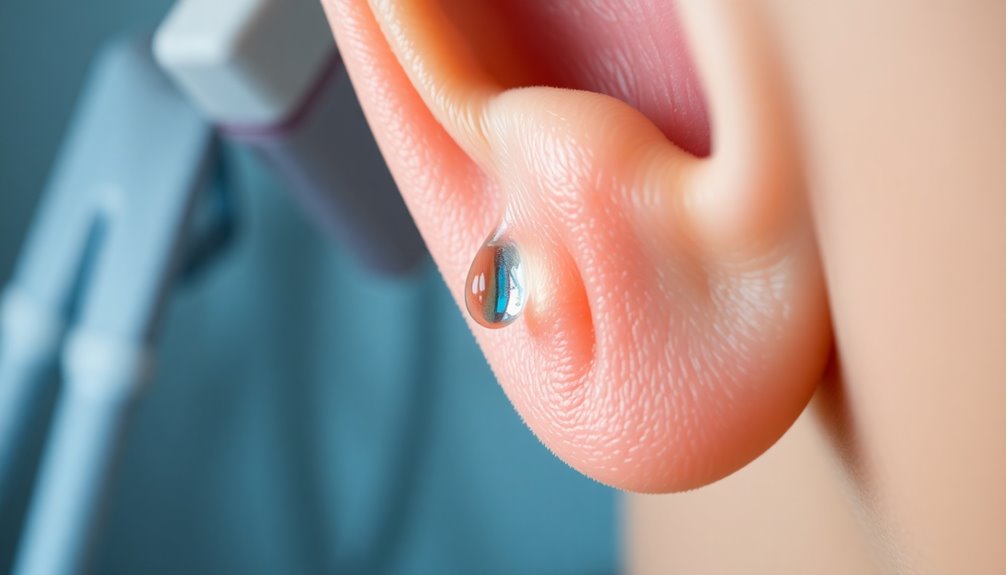If your earwax smells, it might be due to bacteria buildup or underlying medical issues. Excessive wax can block your ear canal, creating an environment for bacteria to thrive. Conditions like ear infections or even foreign objects trapped in your ear can also cause unpleasant odors. You might notice symptoms like earaches, drainage, or hearing difficulties. Different earwax types can affect odor intensity too, especially wet earwax, which contains more lipids. If you're concerned about the smell or any symptoms, it's important to seek professional advice. There's more to uncover about managing and understanding your ear health.
Key Takeaways
- Smelly earwax often results from excessive buildup, leading to bacteria accumulation in the ear canal.
- Ear infections, like otitis externa, can produce foul odors due to moisture and inflammation.
- Foreign objects trapped in the ear create an environment for bacterial growth, causing odor and potential pain.
- Certain growths, such as cholesteatoma, can lead to infections and unpleasant smells in the ear.
- Persistent odors may indicate rare conditions, such as ear cancer, requiring immediate medical attention.
Causes of Smelly Earwax
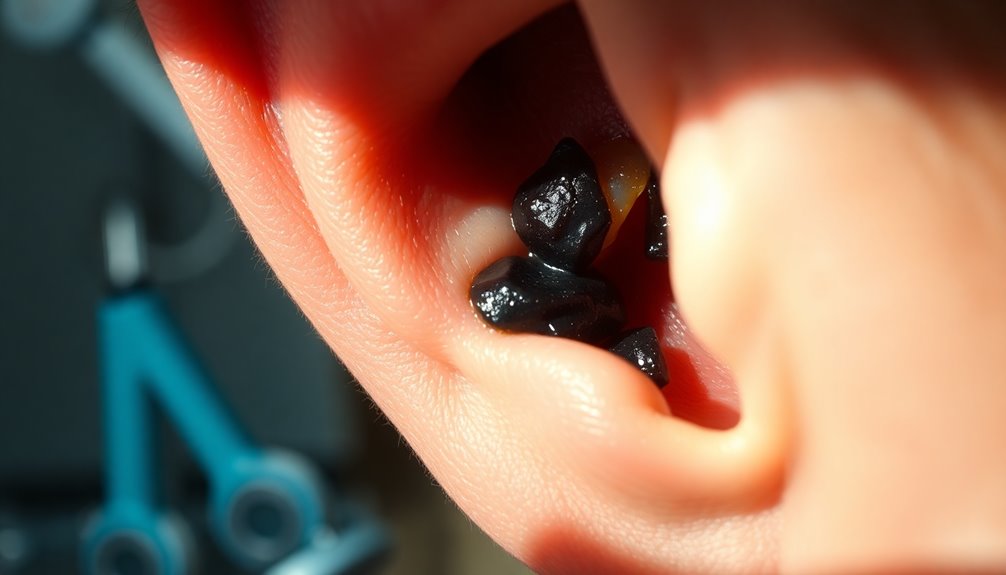
Smelly earwax often has several underlying causes that can affect your ear health. One common reason is excessive earwax buildup. When your ear produces more wax than usual, it can block the ear canal, leading to the accumulation of bacteria and dead skin cells. This buildup not only causes an unpleasant odor but may also reduce sound conduction, resulting in mild hearing loss and discomfort.
Another significant cause is ear infections, like otitis externa. These infections occur when bacteria or fungi invade the ear canal, often after exposure to moisture, such as swimming. You might notice symptoms like itching, redness, and discharge, which can contribute to the foul smell. Protecting the ear is essential to prevent these infections and maintain overall ear hygiene.
Foreign objects, such as beads or small toys, can also lead to smelly earwax. If an object gets stuck in your ear, it can create an environment for bacteria to thrive. In more serious cases, growths like cholesteatoma can develop, causing infections and bad odors.
Lastly, while rare, serious conditions like ear cancer can produce a foul smell from the ear. It's crucial to seek medical attention if you experience persistent odor or other alarming symptoms.
Symptoms of Smelly Earwax
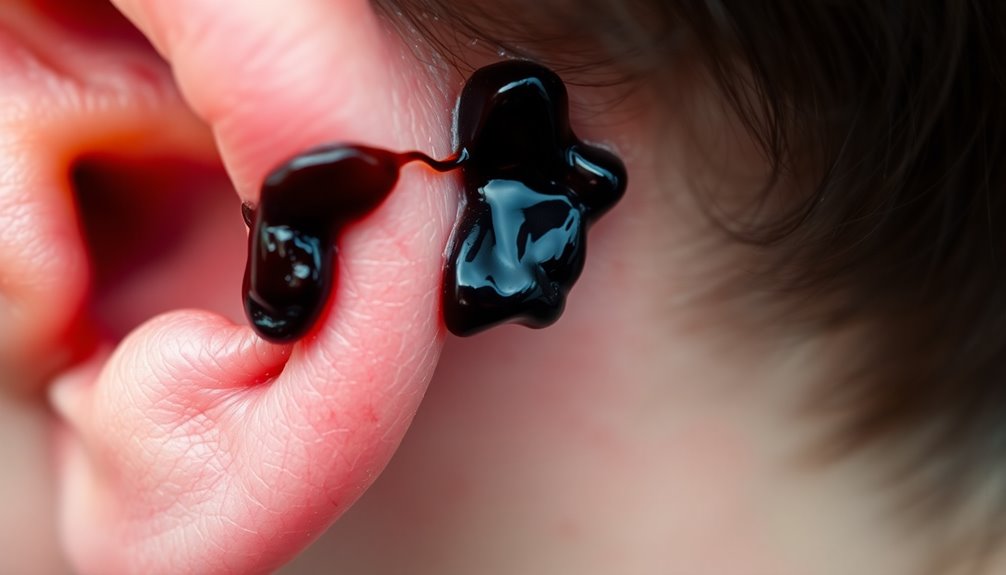
Many people may not realize that smelly earwax can come with various symptoms that indicate an underlying issue. If you're experiencing excessive earwax buildup, you might notice earaches, difficulty hearing, or even drainage from your ear. Itching in the ear canal is another common symptom that could signal a blockage.
In some cases, smelly earwax can be linked to ear infections. If you have ear pain, especially if you're having trouble sleeping or hearing—particularly in children—this might be a sign of infection. Watch for other symptoms like fever or increased irritability in kids, which can indicate something more serious. Excessive moisture may also contribute to the development of foul-smelling earwax, making it essential to keep your ears dry.
If you've been swimming or suspect a foreign object is lodged in your ear, you may also experience pain, hearing loss, or redness inside the ear. Itching and potential infection could follow as well.
Lastly, keep an eye out for more serious conditions like cholesteatoma or even ear cancer. Symptoms like pus, mild discomfort, loss of balance, a noticeable tumor in the ear, or facial paralysis should prompt immediate medical attention. Don't ignore these signs; they can indicate a need for professional evaluation and care.
Types of Earwax and Their Odor

Understanding the types of earwax can help you recognize how odor relates to its composition. There are two primary types: wet and dry. Wet earwax, determined by your ABCC11 gene, is sticky and viscous, ranging from dark yellow to brown. This type contains about 50% lipid, which can contribute to a stronger odor, especially linked to increased armpit odor due to sweat production. If you have wet earwax, you might notice a distinct smell that could be more pronounced. Moreover, the genetic basis of wet earwax is associated with a dominant allele, which can influence body odor variations.
On the other hand, dry earwax is gray or tan and brittle, with a lower lipid content of about 20%. Typically found in East Asians and some Native Americans, dry earwax is less likely to produce a noticeable odor. Its flaky consistency means it traps less moisture and debris, which can help minimize any unpleasant smells.
Your genetic makeup plays a significant role in determining which type you have, influencing not just earwax but also body odor and sweat production. By understanding these differences, you can better assess whether your earwax odor is normal or something that might require further attention.
Home Remedies for Earwax
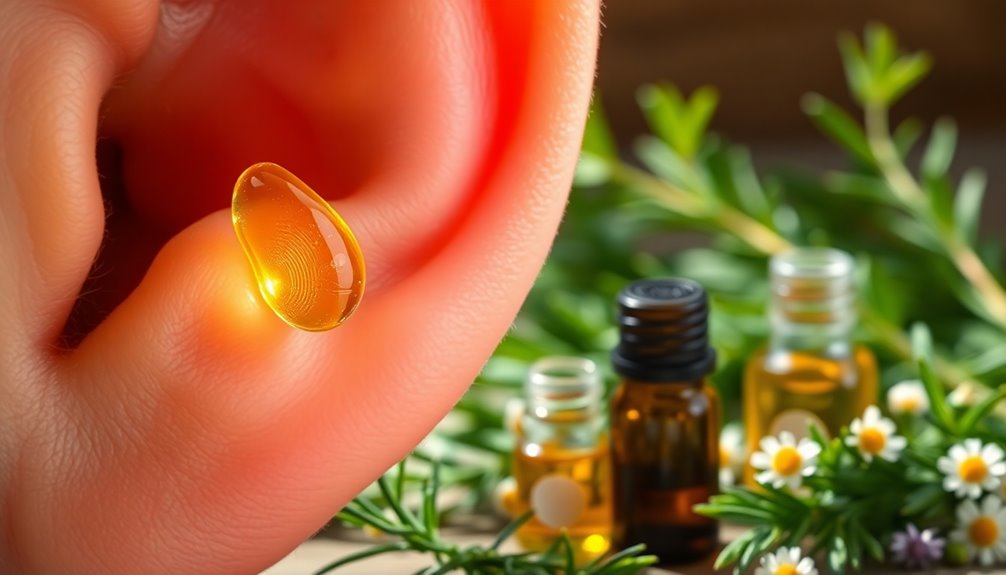
Home remedies for earwax removal can be effective and easy to implement. Start by softening the earwax with a few drops of baby oil, mineral oil, glycerin, or hydrogen peroxide using an eyedropper. Allow the wax to soften for a couple of days before attempting to remove it. You can also use a baking soda solution—mix ½ teaspoon in 2 ounces of warm water—to help soften the wax. Dissolving baking soda in warm water can be a simple and effective method to prepare your ears for cleaning.
Once the wax is softened, consider irrigation techniques. Gently squirt warm water into the ear using a rubber-bulb syringe, tilting your head and pulling the outer ear up and back to straighten the canal. Let the water drain out by tilting your head to the side, catching it in a bowl.
Always remember to avoid inserting cotton swabs or other objects into your ear, as this can push the wax deeper. Also, steer clear of ear candles, which are ineffective and can cause injury. Consult a professional if you have any concerns or if your eardrum has a tube or hole. Combining softening and irrigation methods can yield the best results for effective earwax removal.
Medical Treatment Options
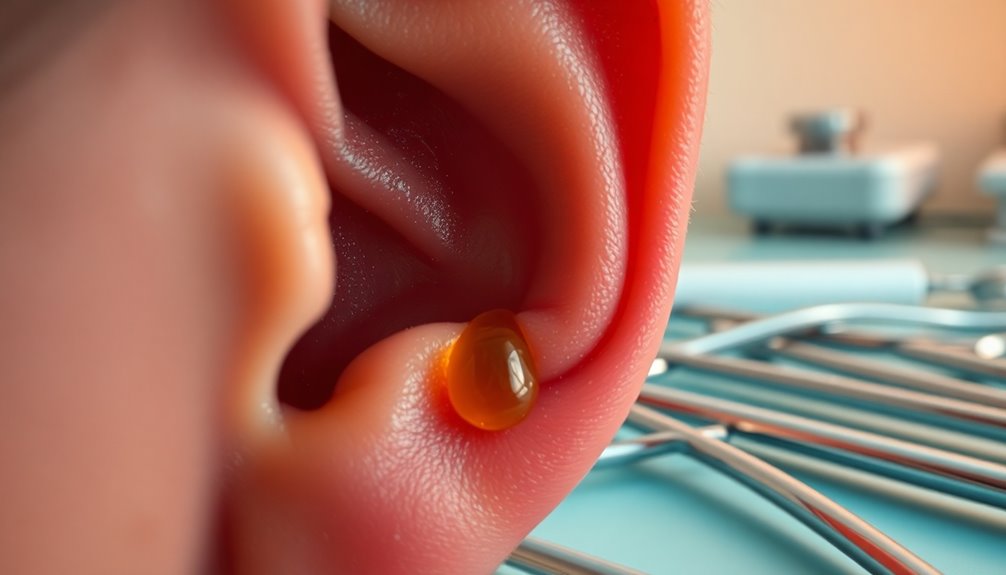
When dealing with earwax that has an unpleasant smell or lack of odor chemical, it's essential to consider various medical treatment options.
Complications of Ignoring Symptoms
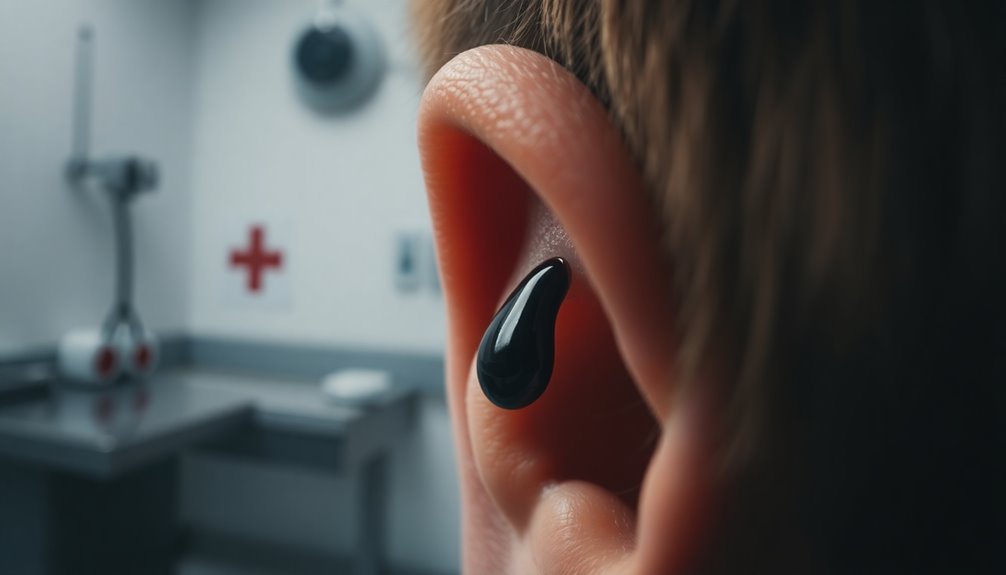
Ignoring symptoms of earwax buildup can lead to serious complications that affect your overall health. When you notice a bad smell, it often indicates a severe infection caused by anaerobic bacteria. These infections can disrupt your balance, cause ringing in your ears, or even damage your middle ear. If left untreated, external-ear infections like swimmer's ear may result in hearing loss and fever.
Excessive earwax can block sound, leading to temporary conductive hearing loss, and chronic infections may damage delicate ear structures. If you neglect these issues, you risk permanent hearing loss. Moreover, earwax buildup can cause dizziness and vertigo, complicating your balance. Severe infections might even spread to your brain, resulting in serious conditions like meningitis. Normal wax typically dries and falls out naturally, but when ignored, it can lead to increased buildup and complications.
The long-term effects of ignoring earwax symptoms can be dire. You could face perforated eardrums, mastoiditis, or conditions like cholesteatoma, which can severely hinder your hearing and balance. Persistent issues may escalate into serious health problems, requiring immediate medical attention. Don't wait for symptoms to worsen; addressing earwax buildup early can save you from significant complications.
Importance of Regular Check-ups
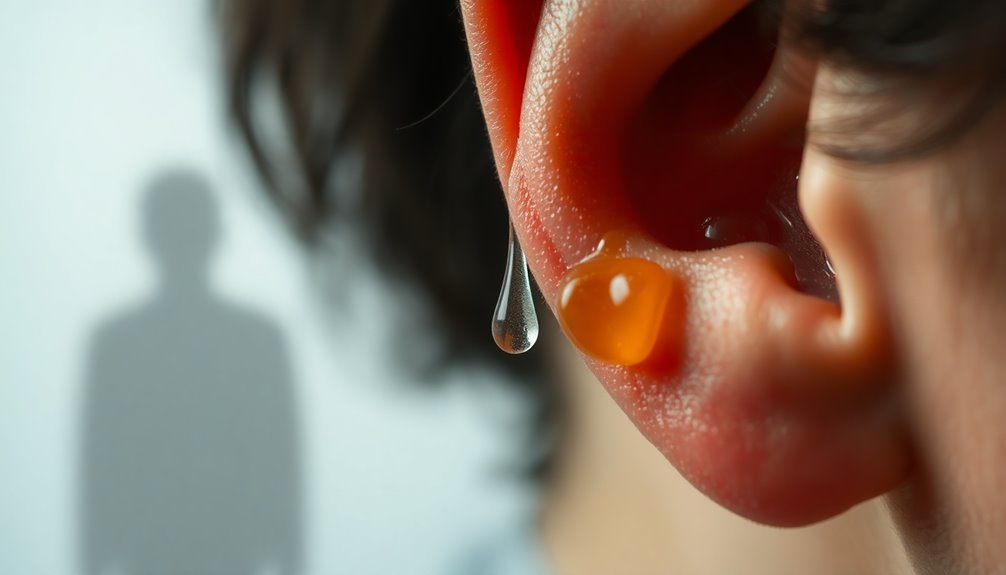
Regular check-ups play a crucial role in maintaining your overall health and well-being. They help identify potential health problems before they escalate into severe issues. By detecting conditions like heart disease, diabetes, and some cancers early, you often gain access to more treatment options and better outcomes. Regular visits to your healthcare provider also allow for monitoring any existing health concerns, ensuring that underlying conditions are addressed based on your age, health status, and family history.
These check-ups encourage you to maintain or adopt a healthier lifestyle. You can discuss diet, exercise, and other factors that affect your well-being. This support helps you reduce stress, eat balanced meals, and stay active, making it easier to implement positive changes like quitting smoking or losing weight. Additionally, early detection of issues can improve long-term health outcomes, making these visits even more essential.
Additionally, regular check-ups keep your vaccinations and screenings up-to-date, which is essential for preventing illnesses. They can also save you money in the long run by reducing the risk of serious conditions that require costly treatments. Ultimately, fostering a relationship with your primary care physician allows for personalized care, making preventive measures a smart investment in your long-term health.
Frequently Asked Questions
Can Diet Affect the Smell of My Earwax?
Yes, your diet can definitely affect the smell of your earwax. Consuming dairy, gluten, or caffeine might lead to increased earwax production and odor. Spicy foods and high-sugar items can also stimulate this. On the flip side, eating omega-3-rich foods, staying hydrated, and incorporating plenty of fruits and vegetables can help maintain healthier earwax. Adjusting your eating habits can make a difference in managing both production and odor of your earwax.
Is Smelly Earwax a Sign of Serious Illness?
Smelly earwax can sometimes be a sign of a serious illness, but it's not always the case. You should pay attention to other symptoms like ear pain, hearing difficulties, or unusual discharge. If you notice these signs, it's best to consult a healthcare professional for an accurate diagnosis. Ignoring potential issues could lead to complications, so taking action is important if you're concerned about the odor or any accompanying symptoms.
How Often Should I Clean My Ears?
You don't need to clean your ears regularly, as earwax naturally moves out of your ear canal. Only clean the outer part with a washcloth, and avoid inserting anything into your ear. If you notice symptoms like blockage or pain, it's best to consult a healthcare provider. Over-cleaning can lead to issues like earwax impaction, so stick to cleaning only when necessary and let your body do its job!
Are Certain Medications Linked to Smelly Earwax?
There aren't any specific medications linked to smelly earwax. Instead, the odor usually results from infections or excess earwax. If you're experiencing a smell, it's often best to focus on treating underlying conditions rather than adjusting medications. Antibiotics can help with infections that might contribute to the smell, but they don't directly cause it. If you're concerned, consult your healthcare provider for the best approach to manage your symptoms.
Can Stress Influence Earwax Odor?
Yes, stress can influence earwax odor. When you're stressed, your body activates the sympathetic nervous system, which can boost earwax production. This increased production, combined with sweat from your apocrine glands, leads to more odorous earwax. The type of earwax you have also plays a role; wet earwax tends to smell more than dry earwax. If you notice a significant change in odor, it might be worth consulting a healthcare professional.
Conclusion
In conclusion, if you notice a foul smell coming from your earwax, it's essential to pay attention to your body's signals. Smelly earwax can indicate underlying issues that might require treatment. Don't ignore the symptoms—consider home remedies or consult a healthcare professional for proper care. Regular check-ups can help prevent complications and keep your ears healthy. Stay proactive about your ear health, and you'll ensure your ears remain in great shape!


